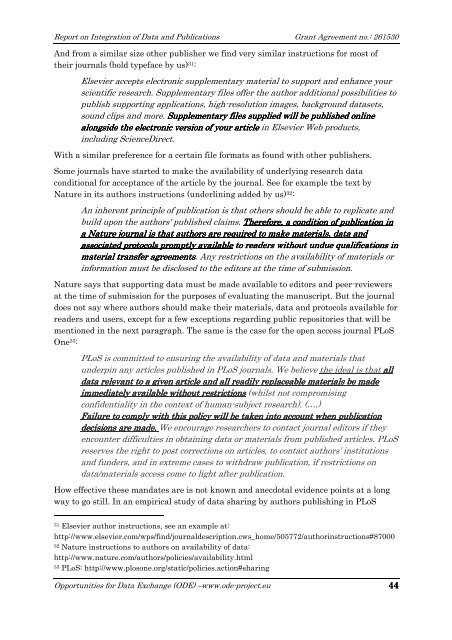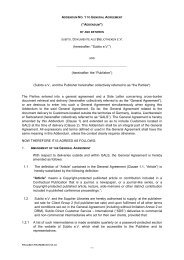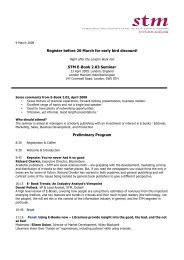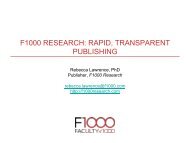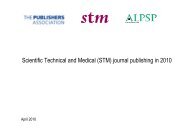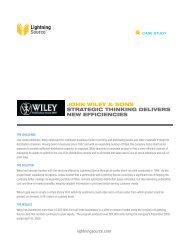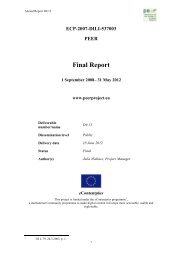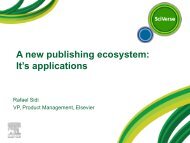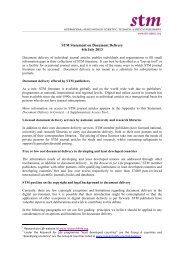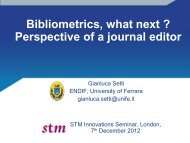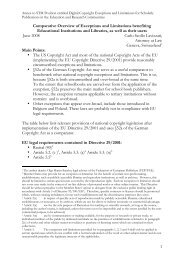Integration of Data and Publications - Alliance for Permanent Access
Integration of Data and Publications - Alliance for Permanent Access
Integration of Data and Publications - Alliance for Permanent Access
You also want an ePaper? Increase the reach of your titles
YUMPU automatically turns print PDFs into web optimized ePapers that Google loves.
Report on <strong>Integration</strong> <strong>of</strong> <strong>Data</strong> <strong>and</strong> <strong>Publications</strong> Grant Agreement no.: 261530<br />
And from a similar size other publisher we find very similar instructions <strong>for</strong> most <strong>of</strong><br />
their journals (bold typeface by us) 31 :<br />
Elsevier accepts electronic supplementary material to support <strong>and</strong> enhance your<br />
scientific research. Supplementary files <strong>of</strong>fer the author additional possibilities to<br />
publish supporting applications, high-resolution images, background datasets,<br />
sound clips <strong>and</strong> more. Supplementary files supplied will be published online<br />
alongside the electronic version <strong>of</strong> your article in Elsevier Web products,<br />
including ScienceDirect.<br />
With a similar preference <strong>for</strong> a certain file <strong>for</strong>mats as found with other publishers.<br />
Some journals have started to make the availability <strong>of</strong> underlying research data<br />
conditional <strong>for</strong> acceptance <strong>of</strong> the article by the journal. See <strong>for</strong> example the text by<br />
Nature in its authors instructions (underlining added by us) 32 :<br />
An inherent principle <strong>of</strong> publication is that others should be able to replicate <strong>and</strong><br />
build upon the authors' published claims. There<strong>for</strong>e, a condition <strong>of</strong> publication in<br />
a Nature journal is that authors are required to make materials, data a <strong>and</strong><br />
associated protocols promptly available to readers without undue qualifications in<br />
material transfer agreements. Any restrictions on the availability <strong>of</strong> materials or<br />
in<strong>for</strong>mation must be disclosed to the editors at the time <strong>of</strong> submission.<br />
Nature says that supporting data must be made available to editors <strong>and</strong> peer-reviewers<br />
at the time <strong>of</strong> submission <strong>for</strong> the purposes <strong>of</strong> evaluating the manuscript. But the journal<br />
does not say where authors should make their materials, data <strong>and</strong> protocols available <strong>for</strong><br />
readers <strong>and</strong> users, except <strong>for</strong> a few exceptions regarding public repositories that will be<br />
mentioned in the next paragraph. The same is the case <strong>for</strong> the open access journal PLoS<br />
One 33 :<br />
PLoS is committed to ensuring the availability <strong>of</strong> data <strong>and</strong> materials that<br />
underpin any articles published in PLoS journals. We believe the ideal is that all<br />
data relevant to a given article <strong>and</strong> all readily replaceable materials be made<br />
immediately available without restrictions (whilst not compromising<br />
confidentiality in the context <strong>of</strong> human-subject research). (….)<br />
Failure to comply with this policy will be taken into account when publication<br />
decisions are made. We encourage researchers to contact journal editors if they<br />
encounter difficulties in obtaining data or materials from published articles. PLoS<br />
reserves the right to post corrections on articles, to contact authors’ institutions<br />
<strong>and</strong> funders, <strong>and</strong> in extreme cases to withdraw publication, if restrictions on<br />
data/materials access come to light after publication.<br />
How effective these m<strong>and</strong>ates are is not known <strong>and</strong> anecdotal evidence points at a long<br />
way to go still. In an empirical study <strong>of</strong> data sharing by authors publishing in PLoS<br />
31 Elsevier author instructions, see an example at:<br />
http://www.elsevier.com/wps/find/journaldescription.cws_home/505772/authorinstructions#87000<br />
32 Nature instructions to authors on availability <strong>of</strong> data:<br />
http://www.nature.com/authors/policies/availability.html<br />
33 PLoS: http://www.plosone.org/static/policies.action#sharing<br />
Opportunities <strong>for</strong> <strong>Data</strong> Exchange (ODE) –www.ode-project.eu 44


